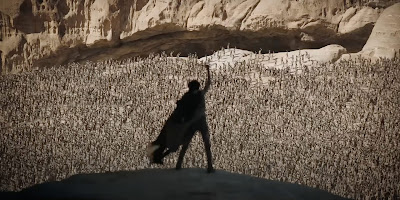Before the fanboys go for me once more, I'll concede this: Warner Bros. and Villeneuve are demonstrably committed to this mumbo jumbo. However many hours we're fated to waste watching this series, they are as nothing compared to the time and effort these creatives have spent extracting Herbert's spare parts, slotting them together and buffing the whole to a dully burnished sheen. These Dune movies have unarguable scale, if no depth, and after years of event movies offering thin gruel, I can see why cinemagoers have happily settled for that. Mumbo jumbo it remains, though: semi-impenetrable messianic claptrap, stubbornly sealed off in its own universe (which explains the free pass Villeneuve has enjoyed on the films' orientalism), shuffling out of one bunker and into another, stuffed end-to-end with dialogue that sounds no less pompous in American English than it does in this script's elaborately invented mother tongue. Few recent blockbusters have seemed this much of a grind; Villeneuve's vision, this time round, involves purging anything that might resemble colour, kinetic energy or fun from the frame. Yes, he's taking his work seriously, as the fanboys are keen to point out and talk up - but then you could say the same thing about the Boston Strangler. Part Two picks up when the much-trailed sandworms finally wriggle clear of the scenery, because after four-and-a-half hours of scenesetting, we finally find ourselves sat before moving pictures rather than a well-lit slideshow of monuments and monoliths. It's a clear dramatic problem, though, that despite this exhaustive rigmarole, the characters doing that funny little heel-toe routine across the dunes emerge as no more than tousle-haired beach rats, raggedy dots on the landscape.
In contemporary film criticism's gushier quarters, Villeneuve is often bracketed together with Christopher Nolan, although - in his strongest films - the latter has demonstrated a facility with actors Villeneuve has yet to match. I might have embraced the idea of Paul Atreides as a potential saviour were he played by anyone other than posterboy du jour Chalamet, who continues to be extravagantly overfilmed and lionised for someone who seemingly represents the human equivalent of a cheese string. (A snack, at best; no more substantial or mysterious than that, and I've spent at least six hours now looking for hidden depths.) Zendaya really is hot casting, though it seems a regrettable failure of the cinematic imagination to bury one of the world's most beautiful women under a series of beige tarps; in and of herself, she appears far too contemporary for a world that means to be mythically dusty, her scowl suggesting a PA snatched the Pinkberry from her hands mere seconds before the cameras started rolling. (Pity: this dour film cries out for sugar and sprinkles.) Not guilty: Dave Bautista, who gets to bash some underling's head into a console, rightly grasping that this franchise could do with a touch of the Royal Rumbles; and Stellan Skarsgård, who now seems cosy - nay, positively toasty - inside his Harkonnen fatsuit. Yet there are plenty of folks waiting around for something to do in a later instalment (Christopher Walken, Florence Pugh), and in the role made campily infamous by Sting in the David Lynch version, lucky Oscar winner Austin Butler may as well be a computer effect: an etiolated, slack-jawed spectre, part Voldemort, part Matt Lucas as George Dawes, he's emblematic of an aggressively bloodless endeavour. Even armed with a plot, Villeneuve's Dune remains largely elephantine: grey, lumbering, stunning when viewed from distance, best dodged by those with any sense of joie de vivre. Yet its trumpeting loudness is that of flatulence - and there was a time when faced with such guff, such naffly old spice, critics would blow a few raspberries back at the screen, rather than huffing it deep into their very souls, as if it were nitrous, or life itself.
Dune: Part Two is now playing in cinemas nationwide.

No comments:
Post a Comment